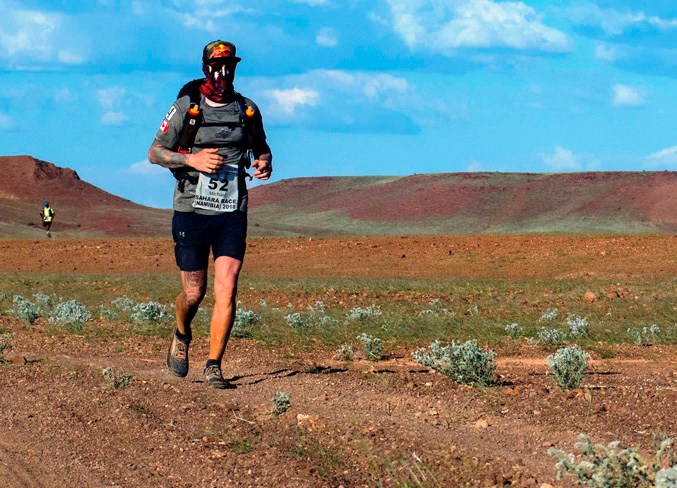When Michael McLean played hockey as a youth in Barrhead, running was a means to an end. Like most Canadian teens, McLean loved to play hockey, something he did competitively through the Barrhead Minor Hockey Association going through the ranks, eventually playing midget with the Steelers.
When he wasn’t playing hockey, in order to stay in shape McLean took up running — more specifically cross-country running.
However, little did he know that later in life the activity would replace hockey as his sporting passion.
On May 5, McLean, 35, finished the Sahara Race Namibia in 29 hours and 33 minutes good enough for sixth place overall.
The race is a 250 kilometre ultra-marathon, which takes place in stages over the course of a week, in Namibia’s coastal desert, the Namib. It is part of Racing the Planet’s 4 Deserts Race Series which hosts four 250 kilometre desert races across the globe.
“I actually feel pretty good. My body was definitely tired and needed to eat, but when I finished I was still able to move about quite easily. I wasn’t doing that gingerly runners walk. Now I know that I can push a little bit harder next time,” McLean said, from his home in Brunei where he works in the oil industry with Maersk Drilling, an offshore drilling company, a week after competing in the race.
He has worked for the company for over 10 years, four years with its operations in Houston, Texas, and six years in Thailand.
Because racers had to be selfsufficient, the only thing organizers provided was a tent at the camps between stages McLean said racers had to bring everything with them, from a first-aid kit to food. Water was available at checkstops located about every 10 kilometres on the course.
“You definitely got your calories, but nutrition was limited to freeze-dried meals, energy gels and electrolyte and protein shake mixes,” he said.
The first stage started April 29, a 42-kilometres stretch, the equivalent of a marathon, starting at Namibia’s Skelton Coast.
The next day participants moved inland running another 42 kilometres over the what locals call the Diamond Trail. On the third day, competitors returned to the coast to race their third straight marathon.
Stage four, called the “Long March”, was the longest of all the stages, 81 kms through the world’s oldest desert.
“I did push myself on the first three stages, I was very cognizant that I needed to have enough energy in reserve, so I wouldn’t have a blowout,” McLean said. “Things went really well for me during the Long March and I finished in fifth place.”
In the first two stages, he finished sixth and placed fifth for the third stage.
After having a day to recover, McLean was back at it, tackling Stage five a 40 kilometre trek that included traversing the world’s largest sand dunes, ranging from 80 metres to 325 metres in height.
“I actually finished in fourth that day, so I was actually getting stronger through the competition,” he said, adding the final stage of the race finished with a comparatively short 10 kilometre run. “Basically it is kind of a victory lap for everyone who was able to finish.”
McLean said he took up running in earnest when he moved to Huston.
“Everywhere I have lived and gone I always have taken my running shoes. Running is good exercise, a good release from work and anyone can do it. All you need is a pair of good shoes, shorts, and a T-shirt,” he said, adding eventually the distances he ran kept increasing until he had surpassed what the marathon lengths.
Today, McLean specializes in one-day ultramarathons, where competitors run at least 100 kms or multi-day events such as the one in Namibia.
“Pushing it past the normal distances really requires a lot more training, and even more mental focus, which is one of the reasons why I think I’m attracted to ultra-marathons,” he said.
McLean’s first ultra-marathon event was in November 2014, a 50 kilometrerace just outside Houston.
Since then he has taken part in numerous events including another 4 Deserts Race Series race in Chile in 2016.
On a regular week, McLean runs six days a week, running on average 180 kilometres a week, saying his current home in Brunei, is the perfect environment for training.
“I’m only 200 metres from the beach and it is a long stretch which is the perfect training grounds for sand and desert running. Plus it is quite hot here, ranging from 30 to 35 [Celsius] most days and a humidity level of 85 to 95 per cent,” he said, adding the daytime temperatures were similar to the ones he experienced in Namibia.
Currently McLean said, he is still recuperating from the Namibia race, and is only running 40 kilometres a week, but will soon ramp that up to 80 kilometres and then 140 plus in preparation for the 4 Deserts Race Series race, The Golby March in Mongolia.
“Up to this point [May 21] I just more or less did what my body has allowed, some distance jogs,” he said.
After that McLean plans to run in two Ultra-Trail World Tour 125 kilometre one-day events in Quebec, in September, followed by one in Cape Town, South Africa in early September.



